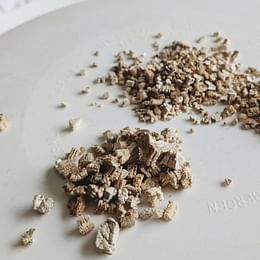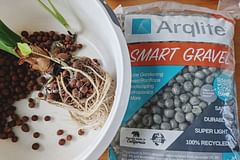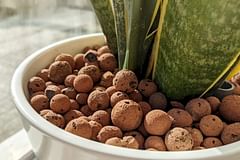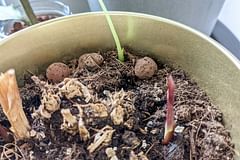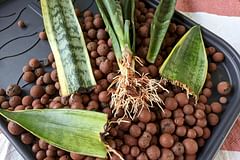What is Vermiculite and how can you use it with houseplants?
Vermiculite is a soil-less growing-medium that's perfect to use when propagating your plants or to help your soil retain more moisture. It helps to make your soil a great place to grow new roots and grow more quickly. In this guide we're going to look at what Vermiculite is and how you can use it with your houseplants.
Vermiculite are rectangular, super-light particles that are created by superheating a hard mineral. By superheating this mineral, it expands and creates air pockets, a little like heating corn kernels to get popcorn. Vermiculite has the amazing ability to retain a lot of moisture, to help create the perfect growing environment for your moisture-loving houseplants.
Previously, we've looked at Leca as a soil-less growing medium, for those plants that like to dry out every once in a while. Vermiculite is the opposite and is perfect for those plants that love moisture. Vermiculite is also great for your next propagation project.
In this guide, we're going to look at these topics:
Let's get right into it because I'm very excited to share this amazing growing medium with you!
What is Vermiculite?
In the introduction, we've discovered that Vermiculite is a superheated mineral. This super-heating process turns the mineral from hard rock into very lightweight woodchip-like blocks. These blocks come in various sizes, from a few millimeters to about 1.5 cm (0.5 inch). These sizes make quite a bit of difference when you're using them to grow your houseplants. The larger particles are great for using on their own to grow your houseplants, while the smaller particles are great to mix in with some soil.
People usually use Vermiculite for their fruit and vegetable gardens, because these plants love moist soil all the time. Vermiculite is sterile, which means it won't change the pH levels of your soil. This is important to know because it means that you can add it to your soil without having to add any pH-neutralizers.
What are the advantages and disadvantages of Vermiculite for houseplants?
Three Vermiculite sizes
Vermiculite is a great long-term solution to grow your moisture-loving plants. But when there are advantages, there must also be some disadvantages to using Vermiculite. Let's go through the pros and cons to help you decide if Vermiculite is something you'd like to try.
The advantages of Vermiculite
Vermiculite retains moisture a lot better than soil. Besides retaining water well, it also holds onto nutrients and generally keeps its shape. This helps to aerate the soil, as oxygen can freely pass between the larger particles to your plant's roots. The combination of these 3 things makes it a very nice place for growing moisture-loving plants, including fruits and vegetables.
Propagation
Vermiculite can be mixed in with soil, or be used on its own. It's a perfect growing medium when you're propagating your plants. It's a little like propagating your plants in water, but adding oxygen flow to the water. When you're propagating with only water, very little oxygen will reach the roots. Since Vermiculite is a collection of solid particles, oxygen can easily pass between the individual pieces to reach the roots of your plant.
Light soil
When you mix Vermiculite with your soil, you're adding very lightweight pockets of air to your soil. When your soil is light while retaining moisture well, your plant can more easily grow roots. Generally, when you have moist potting soil, becomes dense and quite heavy. This heavy soil makes it more difficult for your plant to grow roots more quickly.
The light and airy soil promotes growth and allows the roots to spread throughout the pot more quickly. Heavier, denser soil blocks more oxygen from reaching the roots, while the Vermiculite helps to improve the oxygen flow.
Fertilizing
Vermiculite, unlike most other hydroponic growing mediums, is great at absorbing nutrients. Vermiculite helps your plants to absorb nutrients more quickly, which is great for promoting a lot of quick growth. Now you can see why fruit and vegetable growers regularly use this growing medium.
Long-term solution
Vermiculite is a sterile growing medium without any living organisms. The biggest benefit of this is that Vermiculite can't go bad. It's naturally resistant to fungi, mold, and other diseases. This makes it a perfect part of the soil for your moisture-loving plants. This type of moisture is usually a perfect place for fungi to grow.
The disadvantages of Vermiculite
Vermiculite is great, but it also has a major disadvantage. When you're using it, it's very important to experiment to find the right proportions of Vermiculite to soil. If you add too much Vermiculite, it's quite easy to overwater your plants. The water-retaining properties that are the huge benefit of Vermiculite, can quickly turn into its downside. It holds onto moisture for a very long time and doesn't drain well by itself. This could cause root rot.
To help prevent this, you can add other ingredients to the soil mixture that help to drain the moisture more easily, like perlite or pumice. More on this in a later section.
How does Vermiculite fit into your plant care routine?
Vermiculite is easy to use in your plant care routine. In this section, we'll look at a few of the different plants and plant types that could benefit from Vermiculite and whether it's a good idea for you to try it out.
Can I use Vermiculite for all types of houseplants?
You might be wondering if Vermiculite is a one-size-fits-all solution for your various houseplants. The short answer is, no, Vermiculite can benefit many plants, but there are some plants that you shouldn't use Vermiculite with. Let's dive into the reasons why.
Vermiculite is especially helpful for plants that thrive in moist soil, like fruits, vegetables, seeds, and tropical plants. It also works well for houseplants that prefer a more acidic soil, like azaleas and rhododendrons. And because it doesn't contain any organic matter, Vermiculite won't break down over time or attract pests or diseases.
Are there any specific plants that benefit more from Vermiculite?
So are there any specific plants that could benefit more than others from Vermiculite? Yes, especially the moisture-loving plants that need to be in moist soil all the time are going to love Vermiculite.
These specific plants include plants like ferns, African violets, and begonias. Vermiculite retains moisture, so it makes sure that these moisture-loving plants never dry out or wilt.
Vermiculite is excellent for potted plants as it is sterile, lightweight, and easy to work with. It can also be mixed with other soil types to create a nutrient-rich blend ideal for plants like tomatoes, peppers, and cucumbers.
It's also ideal for seed germination. The fine particles of Vermiculite hold onto moisture and nutrients, creating a perfect environment for the seeds to sprout. This mineral also does not pack down or harden like other soil mediums, making it easy for the new plants' roots to establish themselves.
Is Vermiculite safe for indoor plants and pets?
Vermiculite is a natural mineral that's perfect for your indoor plants and pets. It's safe and won't introduce any threats to your home. It has a great reputation as a reliable and safe resource for your gardening needs.
This mineral ensures a healthy and safe indoor environment for your plants and your pets. When choosing vermiculite, you can be confident that your plants and pets won't face any risks or dangers.
How does Vermiculite improve the plant soil?
Vermiculite greatly improves soil quality, helping plants retain water and nutrients for optimal growth. Let's see how this amendment transforms soil structure and improves plant growth.
How does Vermiculite help with retaining water in the soil?
Vermiculite particles have a porous structure that allows them to hold much more water that you might expect. Vermiculite soaks up water like a sponge and then slowly releases it, giving your plants the water they need to grow. By blending Vermiculite into your potting mix or soil, you can keep your plants hydrated for longer periods, which is great if you often forget to water your plants.
Not only does Vermiculite help to keep plants hydrated, but it also has other benefits for cooling soil in hot temperatures and air circulation.
Can Vermiculite improve aeration in the soil?
Since Vermiculite is a very porous material with large air pockets, it's a great way to keep your soil light and airy, even when it's moist most of the time.
It's especially helpful for improving aeration in heavier soils (like permanently moist potting soil), which are dense and can make the flow of oxygen to your plant's roots more difficult. This helps to prevent root rot in plants that love to grow in moist soil.
How you can use Vermiculite to grow your houseplants?
Calathea Ornata growing in Vermiculite mix
So you've decided to keep reading after seeing the biggest disadvantage and still think trying Vermiculite is worth a try? Great! In this section, I'll give you the soil mix proportions I've used for my Calathea Ornata, which is a picky plant that loves moisture. This soil mixture brought it back from death and helped the plant thrive, without too much effort.
This fact makes me so excited to share this soil mixture with you because if it helped me, it might help you too!
The Vermiculite soil mixture
A great mix of Vermiculite in soil, as we've already discussed in How to make your soil retain more water?, is:
- 1/6 Vermiculite
- 2/6 perlite/sand/pumice
- 1/2 general potting soil
This mixture gives you great moisture retention but also makes sure the soil doesn't retain too much water. This soil mixture also helps to get plenty of oxygen to your plant's roots, providing it with the moisture it loves, while also providing excellent drainage. I'm very excited about this soil mixture and I hope it helps you to take care of your moisture-loving plants too.
How much vermiculite should I mix into the soil?
The soil mixture of the previous section is a great mixture for a moisture-loving plant like Calathea, but that doesn't mean it'll work for other plants. Because vermiculite holds onto so much moisture, you shouldn't use it for drought-loving plants like succulents and cacti.
If you do have a moisture-loving plant, try to stick to 1/6 vermiculite, for some plants, you could go up to 1/4, but don't use more than that if you're not also adding ingredients to help with drainage. Potting soil is generally also quite good at holding onto moisture, so you're using vermiculite to keep the soil moist for longer.
By adding more than 1/4 of vermiculite, you risk having wet soil, which might cause root rot.
However, if you are planting seeds, you may want to use a higher proportion of Vermiculite to make sure there is enough proper drainage, aeration, and moisture retention. A ratio of 50% vermiculite to soil is a good option for starting seeds.
Can I use Vermiculite as a standalone growing medium?
Vermiculite is great at holding onto moisture and giving the soil a bit of structure, but can you also use it on its own, without adding soil?
You can, but I wouldn't recommend it for long-term planting. By only using vermiculite, you'll have a lot of moisture and very little drainage in your pot. Most plants don't like this, but it is quite good for seeds.
Besides drainage, vermiculite is super-heated rock, so it doesn't contain any nutrients your plants need to grow. You'll need to add these nutrients by using a hydroponics fertilizer. A normal plant fertilizer won't work, as this needs soil to work properly. Hydroponics fertilizer works without any soil, so it's a good option for use with vermiculite.
Where can I buy Vermiculite for my houseplants?
Looking to buy Vermiculite for your houseplants? You're in luck! Most garden centers and home improvement stores have it in stock. Start your search at your local nursery or garden center - they usually carry a wide variety of soil additions and fertilizers. Another option is your nearest home improvement store, as they often have gardening supplies available.
You can find Vermiculite for sale online too. Some websites, like Perfect Plants Nursery specialize in gardening and home improvement items; they may have a wider selection than local stores. Just remember, buying online might mean higher shipping costs.
Conclusion
Vermiculite is a hydroponics growing medium that is also very easy to mix with soil to help your moisture-loving plants thrive. Vermiculite is naturally resistant to fungi, mold, and other diseases and can absorb nutrients to feed your plant. Its only disadvantage, that I've experienced, is that it's very important to experiment with Vermiculite to find the right proportions between it and soil. Vermiculite is a very versatile growing medium and has already proven its worth to me by saving my Calathea Ornata.
Thank you for reading this post! I hope it helps you to keep your plants healthy and beautiful! If you're looking for more guides on specific plants, you can always request a plant guide to get a guide for the plant you have trouble with.
Test your plant care knowledge
Quiz completed!
Want to learn more? Sign up for my newsletter to receive free tips in your inbox!
Sign up now!






